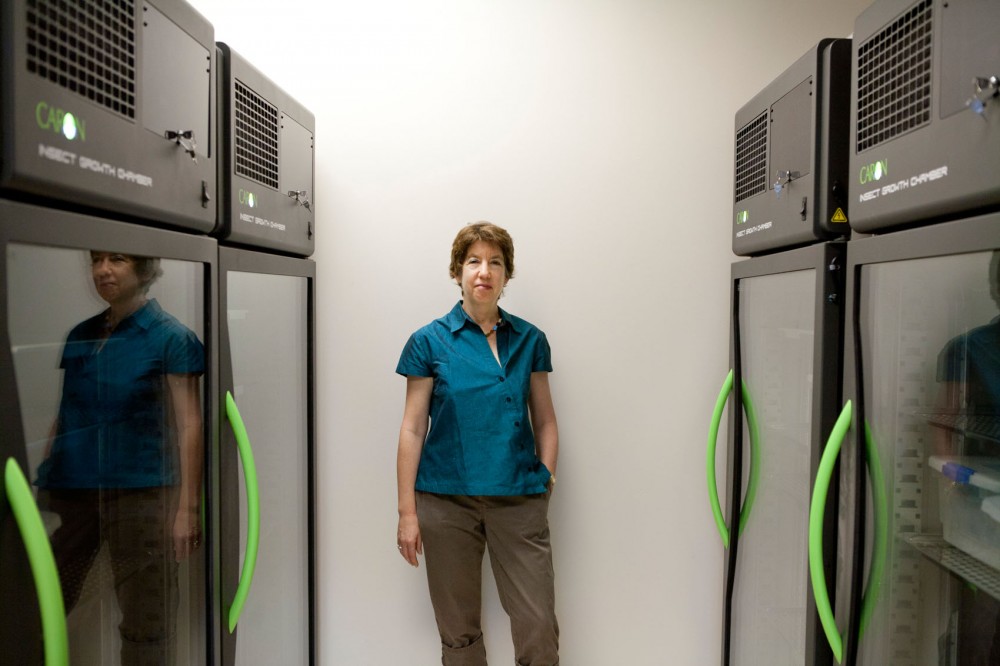Like most kids, Marlene Zuk said she was interested in bugs as a little girl.
“I think if you’re a kid in a city, and you like animals, it’s easier to keep caterpillars than deer,” she said.
Her interest never faded and instead turned into a career researching, teaching and writing popular non-fiction books with titles like “Sex on Six Legs.” But she said there’s nothing childlike about what she does today — now, she’s used to questions about whether animals partake in adultery, homosexuality and oral sex.
“There’s nothing like insect sex to make human sex look boring,” Zuk said.
As she finishes up her fourth book, Zuk and her husband John Rotenberry are finally settling into life at the University of Minnesota.
They transferred as a “package deal” in April from the University of California- Riverside, where they had been for more than 20 years. She is now a professor in ecology, evolution and behavior, and he is assistant dean of field stations, both in the College of Biological Sciences.
An ‘exceptional hire’
Her books go beyond sexual behavior to dispel biological misconceptions and discuss life lessons, Rotenberry said.
“A review once called her ‘snarky and a tad feminist,’” he said. “She was thinking of having T-shirts made up of it.”
Feminism is a reoccurring theme in Zuk’s work, and she has given numerous talks about the role of women in science.
Although there are as many or more women enrolled in science programs in universities, she said they are not advancing as quickly as men are.
The department could design a course around this expertise, said Scott Lanyon, the head of EEB. They could also create a course on scientific communication, he said.
“Our problem won’t be coming up with interesting courses for her to teach,” Lanyon said. “It will be limiting it so we don’t overwhelm her with teaching assignments.”
The department has assigned Zuk to teach the behavior section of a new EEB introductory graduate course.
This will be the only course she will teach this upcoming year, since she has already started research in her lab, which is funded through a National Science Foundation grant carried over from her previous position in California.
Starting research before teaching is typical for transferring faculty members, Lanyon said, because it mainly depends on external support.
“The world is so competitive now that if you miss a year of research productivity, your competitiveness for grants goes down,” he said.
‘Lucky for everybody’
Zuk has studied the conflict of natural and sexual selection in the Pacific field cricket and its rapid evolution for more than 20 years.
Her experience was what sparked the University’s interest in her, Lanyon said, though it is rare to hire a senior-level faculty member.
Professor Anne Pusey, who worked with the Jane Goodall Institute, left for Duke University in January 2010, and EEB needed to hire another senior faculty member of her caliber, Lanyon said.
“We posed ourselves the question, ‘If we could hire anybody to replace Anne, who would it be?’” he said, and Zuk’s name was at the top of that list.
Robert Elde, dean of CBS, also realized the different field stations within the college, which includes Itasca Biological Station and Laboratories, needed more coordination, Lanyon said. The college decided to hire the couple as a pair.
“It was lucky for everybody,” Zuk said. “The college was looking for people who did what we did.”
Upon visiting Itasca for the first time, Rotenberry said it reminded him of the field station where the couple first met at the University of Michigan.
In her college years, Zuk said she was originally an English major and then switched to biology because she thought she could have more success that way.
As a scientist, Zuk said she believes she must help the public understand how the world works. She said she hopes to continue this crucial role at the University.
“I see coming here as a way to do a lot of what I’ve been doing in an environment that’s going to allow it to flourish better,” she said. “I think it will give me some new ideas and allow me to think about things in a different way.”


